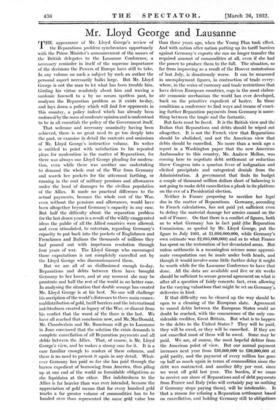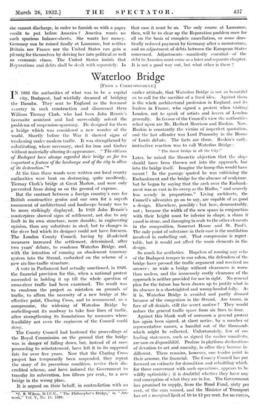Mr. Lloyd George and Lausanne
THE appearance of Mr. Lloyd George's review of 1 the Reparations problem synchronizes opportunely with the Prime Minister's announcement of the names of the British delegates to the Lausanne Conference, a necessary reminder in itself of the supreme importance of the decisions the Powers of Europe have still to take. In any volume on such a subject by such an author the personal aspect necessarily bulks large. But Mr. Lloyd George is not the man to let what has been trouble him. Girding his virtue resolutely about him and waving a sardonic farewell to a by no means spotless past, he analyses the Reparation problem as it exists to-day, and lays down a policy which will find few opponents in this country, a policy indeed which has already been endorsed by the mass of moderate opinion and is understOod to be in all essentials the policy of the Government itself.
That welcome and necessary unanimity having been achieved, there is no great need to go too deeply into the past, or examine in detail the contents and omissions of Mr. Lloyd George's instructive volume. Its writer is entitled to point with satisfaction to his repeated pleas for moderation in the matter of Reparations, for there was always one Lloyd George pleading for modera- tion, even while there was another one undertaking to demand the whole cost of the War from Germany and search her pockets for the uttermost farthing, or running in the cost of military pensions and allowances under the head of damages to the civilian population of the Allies. It made no practical difference to the actual payments, because the whole cost of the War, even without the pensions and allowances, would have been altogether beyond Germany's capacity in any case. But half the difficulty about the reparation problem for the last dozen years is a result of the wildly exaggerated ideas the public of all the Allied countries were allowed, and even stimulated, to entertain, regarding Germany's capacity to put back into the pockets of Englishmen and Frenchmen and Italians the thousands of millions they had poured out with impetuous resolution through four years of war. The Lloyd George who encouraged those expectations is not completely cancelled out by the Lloyd George who discountenanced them.
But we are all of us disillusioned enough to-day. Reparations and debts between them have brought Germany to her knees, and at any moment she may be prostrate and half the rest of the world in no better case. In analysing the situation that double scourge has created Mr. Lloyd George is at his best. No one will challenge his ascription of the world's distresses to three main causes: maldistribution of gold, tariff barriers and the international indebtedness created as legacy of the War, or dissent from his verdict that the worst of the three is the last. We have all reached that conclusion now, and Mr. MacDonald, Mr. Chamberlain and Mr. Runciman will go to Lausanne in June convinced that the solution the crisis demands is complete cancellation of all Reparation payments and all debts between the Allies. That, of course, is Mr. Lloyd George's view, and he makes a strong ease for it. It is a case familiar enough to readers of these columns, and there is no need to present it again in any detail. What- ever Germany has paid so far she has paid through the barren expedient of borrowing from America, thus piling up at one end of the world as formidable obligations as she liquidates at the other. Her indebtedness to the Allies is far heavier than was ever intended, because the appreciation of gold means that for every hundred gold marks a far greater volume of commodities has to be banded over than represented the same gold value less than three years ago, when the Young Plan took effect. And with nation after nation putting up its tariff barriers against Germany's exports she can no longer transfer the required amount of commodities at all, even if she had the power to produce them to the full. The situation, so far from improving as a result of the Hoover moratorium of last July, is disastrously worse. It can be measured in unemployment figures, in contraction of trade every- where, in the series of currency and trade restrictions that have driven European countries, cogs in the most elaborr ate economic mechanism the world has ever developed, back on the primitive expedient of barter. In those conditions a conference to find ways and means of exact- ing further Reparation payments from Germany is some- thing between the tragic and the fantastic.
But facts must be faced. It is the British view and the Italian that Reparations and debts should be wiped out altogether. It is not the French view that Reparations should be abolished, and not the American view that debts should be cancelled. No more than a week ago a report in a Washington paper that the new American Ambassador to this country, Mr. Andrew Mellon, was coming here to negotiate debt settlement or reduction threw Congress into a quartan fever of indignation and elicited precipitate and categorical denials from the Administration. A government that finds its budget a couple of thousand million dollars short of balancing is not going to make debt cancellation a plank in its platform on the eve of a Presidential election.
Neither is France proposing to sacrifice her legal due in the matter of Reparations. Germany, according to French calculations, has not paid yet sufficient even to defray the material damage her armies caused on the soil of France. On that there is a conflict of figures, both as to what Germany has in fact paid (the Reparation Commission, as quoted by Mr. Lloyd George, put the figure to July 1981, at £1,010,000,000, while Germany's own estimate 'was /2,695,000,000) and as to what France has spent on the restoration of her devastated areas. But unless arithmetic is a meaningless science some approxi- mate computation can be made under both heads, and though it would involve some little further delay it might be worth while for the Lausanne Conference to have that done. All the data are available and five or six weeks should be sufficient to secure general agreement on what is after all a question of fairly concrete fact, even allowing for the varying valuations that might be set on Germany's deliveries in kind.'
If that difficulty can be cleared up the way should be open to a cleaning of the European slate. Agreement to cancel debts between the European States could no doubt be reached, with the concurrence of the only con- siderable creditor, Great Britain. But what is to happen to the debts to the United States ? They will be paid, they will be owed, or they will be cancelled. If they are not cancelled most of them will be owed. Some may be paid. We are, of course, the most hopeful debtor from the American point of view. But our annual payment increases next year from £33,000,000 to /88,000,000 at gold parity, and the payment of every million has gone up half as much again in terms of commodities since the debt was contracted, and another fifty per cent. since we went off gold last year. The burden, if we cease to receive our share of Reparations and of debt payments from France and Italy (who will certainly pay us nothing if Germany stops paying them), will be intolerable. Is that a reason for refusing a Reparation settlement based on cancellation, and holding Germany still to obligations
she cannot discharge, in order to furnish us with a paper credit to put before America ? America wants no such spurious balance-sheets. She wants her money. Germany can be ruined finally at Lausanne, but neither Britain nor France nor the United States can gain a pfennig for themselves by driving her into political as well as economic chaos. The United States insists that Reparations and debts shall be dealt with separately. In that case it must be so. The only course at Lausanne, then, will be to clear up the Reparation problem once for all on the basis of complete cancellation, or some dras- tically reduced payment by Germany after a moratorium, and an adjustment of debts between the European States concerned. Adjustments—manifestly essential—of the debt to America must come as a later and separate chapter. It is not a good way out, but what other is there ?



































 Previous page
Previous page